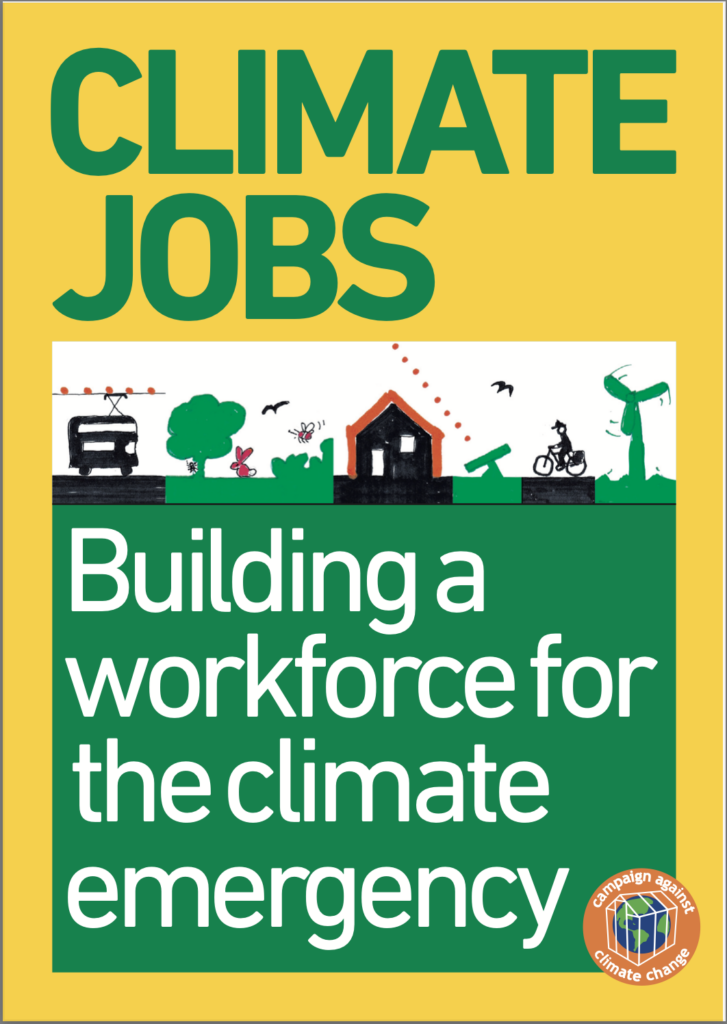最新有關一百萬的氣候工作的文件《Climate Jobs: Building a workforce for the climate emergency》指出,氣候工作會在哪些領域發生:
- 利用可再生能源維持照明可再生能源:能源生產和儲存的氣候工作;
- 溫暖的家園、健康的工作場所:建築領域的氣候工作;
- 創造綠色可負擔、無障礙:運輸中的氣候工作;
- 流程和材料的去碳化:工業中的氣候工作;
- 在土地上工作:食品、農業和自然界的氣候工作;
- 邁向零廢棄:循環經濟中的氣候工作;
一般來說,氣候工作指的是那些直接可以導致縮減溫室氣候排放的工作,並且可以減緩氣候變遷,例如:建立風場代替燒油或煤的發電廠的工作,建築物隔熱的工作,可以降低瓦斯或油的燃燒,汽車駕駛降低燃油量等等。
Climate jobs are jobs that lead directly to cuts in emissions of greenhouse gases, and so slow down climate change. For instance, workers who build wind farms replace power stations that burn coal or oil. Workers who insulate buildings reduce the oil and gas we burn. Bus drivers reduce the amount of oil we burn in cars. (source: One Million Climate Jobs)
「氣候工作」是指有助於減緩或適應氣候變化影響的工作。直到最近,聽到「氣候工作」一詞,您可能會聯想到報告氣候變遷影響的科學家,或是太陽能工程師。如今,氣候工作的範圍從可再生能源到協助企業減少碳足跡的永續發展顧問。它還包括與氣候變化相關的政策、宣導和研究工作,以及支持我們改變一切工作方式的基礎設施!
雖然這些類型的職務在過去可能是較常見的氣候工作範例,但我們現在開始看到,幾乎任何職業道路都能對氣候解決方案有所貢獻。(source: What Is A ‘Climate Job’?)
美國面對氣候危機的努力推動了對有助於國家減緩和適應氣候變化的工作的需求。這些氣候工作在美國一直穩步上升。2020 年,能源產業整體已恢復了 71% 因大流行病而流失的工作機會。2022 年,清潔能源創造的就業機會以 3.9% 的速度增長,超過了整體就業機會的增長速度。2022 年總計有超過 420 萬個氣候工作機會。(source: Fact Sheet | Climate Jobs, 2024)
另外有一份來自南非的文件〈One Million Climate Jobs – A just transition to a low carbon economy to combat unemployment and climate change〉則是給了氣候工作這樣的定義:
氣候工作是以人為主、由公眾驅動的正式的(decent)工作,可減少氣候變遷的成因與影響。
氣候工作建基於三個原則:生態永續、社會公義及國家介入。氣候工作是指能夠:
- 減少我們所排放的溫室氣體,以確保我們能防止災難性的氣候變遷;
- 建立我們適應氣候變遷影響的能力(例如,改善我們糧食安全的工作);
- 提供並確保重要的服務,尤其是水、能源和衛生(這包括減少浪費性的過度消費)。’
正式(decent)的工作: 正式的工作是指安全、提供健康工作條件、提供社會保護、安全及公平工資的工作。這些工作至少符合國際勞工組織的「體面工作」標準,並與滿足大多數人的社會需求等目標一致。從這個意義上說,它們應該是有用的工作。
以人為導向的工作: 經濟發展的驅動力必須主要來自於人,而非利潤。氣候工作所需的資金必須由國家分配,但計劃的執行和監督必須有當地社區的參與。
公共驅動的工作: 國家必須積極參與創造應對氣候變化的工作,雇用和培訓新的氣候工人,並在必要時對工人進行再培訓工人,並在必要時對工人進行再培訓。有些工作可以由國家在氣候服務中直接創造,如擴大的公共工程計劃。其他職位則可能是國家政策、法規、補貼和獎勵的結果,例如:法律規定新建築必須提高能源效率。我們還需要消除低碳經濟的障礙,例如對能源密集型用戶的補貼價格。強調國家
但我們不能依賴企業採取緊急行動,因為他們的盈利底線和對股東的責任大多數會阻止他們做社會和環境所需的事情。
原文:What do we mean by ‘climate jobs’
Climate jobs are decent, people – and publicly driven jobs that reduce the causes and impacts of climate change. Climate jobs are based on three principles: ecological sustainability, social justice and state intervention. Climate jobs are jobs that:
- reduce the amount of greenhouse gasses we emit, to make sure that we prevent catastrophic climate change;
- build our capacity to adapt to the impacts of climate change (e.g. jobs that improve our food security);
- provide and secure vital services, especially water, energy and sanitation (this includes reducing wasteful over-consumption).
Decent jobs: Decent jobs are jobs that are safe, provide healthy working conditions, and offer social protection, security and fair wages. They are jobs that, at the very least, meet the International Labour Organisation standards of ‘decent work’ and are in alignment with goals such as meeting the social needs of the majority of the population. In this sense they should be useful jobs.
People-driven jobs: Economic development must be driven primarily by people, not profits. The necessary funding for climate jobs must be allocated by the state, but the implementation and monitoring of the programme must involve local communities.
Publicly driven jobs: The state must be actively involved in creating
jobs that address climate change, employing and training new climate
workers, and retraining workers where necessary. Some jobs could be created directly by the state in a climate service, as with the Expanded Public Works Programme. Others could be the outcome of state policies, regulations, subsidies and incentives, such as the energy efficiency required by law for new buildings. We also need to remove barriers to a low-carbon economy, such as subsidised pricing for the energy-intensive users. This emphasis on the state
to prevent catastrophic climate change does not exclude the private sector altogether, but we cannot rely on business to take urgent action as their bottom line of profitability and accountability to shareholders mostly prevents them from doing what is required socially and environmentally.
